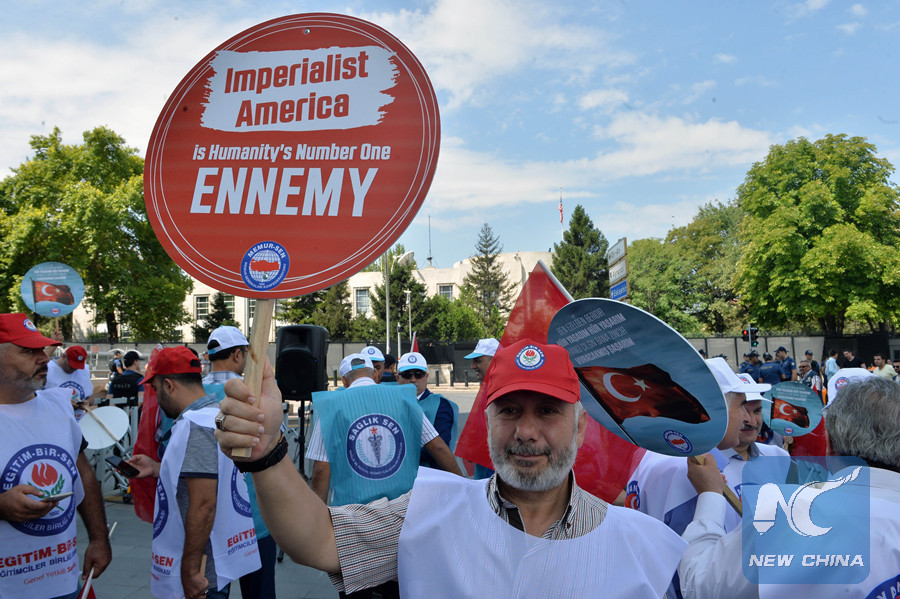
A protester holds an anti-U.S. sign near the U.S. Embassy in Ankara, Turkey, on Aug. 3, 2018. (Xinhua/Mustafa Kaya)
ANKARA, Aug. 3 (Xinhua) -- The ties between Turkey and the U.S. were once again strained by the rare U.S. sanctions on two Turkish ministers over Ankara's refusal to release detained U.S. pastor Andrew Brunson.
"The Turkey-U.S. relations have passed to a stage of sanctions from the stage of intimidation," said Serkan Demirtas, Hurriyet Daily News commentator and an expert on Turkey's foreign policies.
In a rare move, the U.S. Department of Treasury on Wednesday announced the sanctions on Turkey's Justice Minister Abdulhamit Gul and Interior Minister Suleyman Soylu, citing their roles in the detention of Brunson.
Turkey vowed to respond by imposing retaliatory sanctions on the United States.
"This development is a trough in bilateral relations between Turkey and the United States," Demirtas said, comparing it to the 1970s, when the U.S. imposed an arms embargo on Turkey because the Turkish military intervened in northern Cyprus.
The expert noted that Washington has for long warned Ankara against the detention of several U.S. citizens, including Brunson and a U.S. Consulate staff member in Turkey, while expressing displeasure at Turkey's purchase of Russian S-400 anti-missile defense systems.
The U.S. sanctions on Turkey have two paths in the United States, namely the Congress and the administration, Demirtas said, recalling that the U.S. Congress issued a couple of bills to punish Turkey, a NATO ally, over these issues.
"The U.S. administration and Congress are acting in coordination regarding the case about Turkey," he said, stressing that it is worrying that Washington has shifted to a policy of using "sanctions tools" instead of diplomatic channels.
Furthermore, the U.S. Senate overwhelmingly approved a 717-billion-dollar defense bill on Wednesday, which contains an amendment that prohibits the sale of F-35 jets to Turkey until Pentagon issues a report in 90 days.
A U.S. bill that would restrict loans from international financial institutions to Turkey until it frees arrested U.S. citizens was also passed by a Senate committee on July 26.
Brunson, a 50-year-old Christian pastor, was detained two years ago in Turkey on spying charges. He faces up to 35 years in prison if found guilty.
He was accused of having links with the outlawed Kurdistan Workers' Party and the Fethullahist Terrorist Organization, blamed for being behind a failed coup in July 2016.
A Turkish court ruled last week that Brunson should be moved from prison to house arrest over health concerns, but insisted on preventing him from leaving Turkey.
The Brunson case is the latest in several disputes between Turkey and the U.S., which has repeatedly called for his release, claiming he was "unjustly detained."
The Turkish government said Brunson's case is being handled by the courts and the government cannot intervene, stressing that "Turkey is a state of law."
Despite Turkey's decision to get back at the U.S. move, Ankara has not declared any practical move against the U.S. sanctions as of Thursday.
Turkish Foreign Minister Mevlut Cavusoglu and U.S. Secretary of State Mike Pompeo are likely to meet in Singapore on the sidelines of the 51st ASEAN foreign ministers meeting, a Turkish diplomat told Xinhua on condition of anonymity.
U.S. President Donald Trump has threatened many countries, but in the end, he sat with them to negotiate on new deals, said Turkish columnist Ragip Soylu.
Turkish President Recep Tayyip Erdogan's considerable restraint in his public response to Trump implies that he is waiting for the next round of direct engagement, which is likely to happen on the sidelines of the UN General Assembly meetings, Soylu noted.

